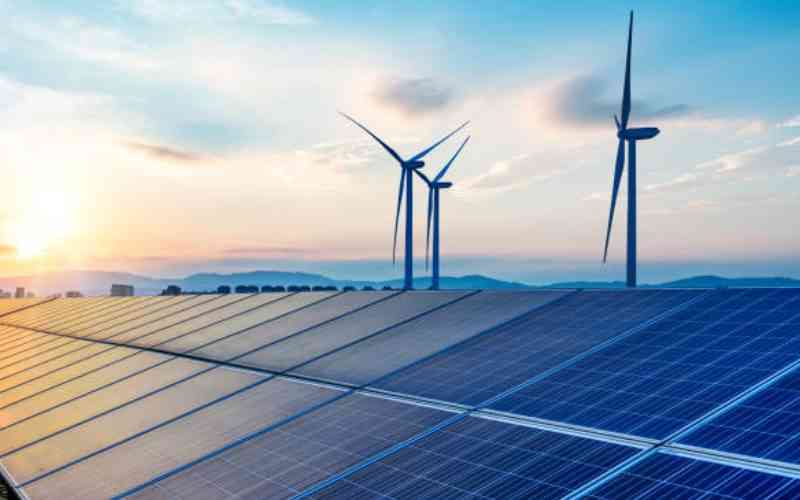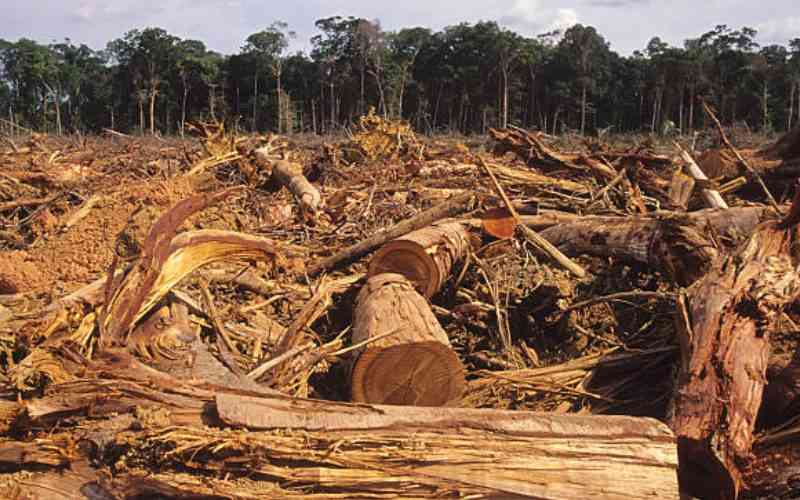
Lack of a robust taxation policy is hurting the uptake of renewable energy, thus contributing to Kenya’s vulnerability to climate change, researchers have said.
According to the researchers, random imposition and removal of taxes, particularly Value Added Tax (VAT) in the energy sector, has led to uncertainty and investor apathy.
A recent baseline study on Kenya’s renewable energy holds that the government’s decision on which type of technology and components should be liable to taxes affects imports and costs of renewable energy technologies.
Renewables, also called green energy, are central to the climate crisis mitigation, because, unlike fossil fuels, they do not emit carbon dioxide and other greenhouse gases that lead to global warming.
They are also pivotal to realisation of the seventh Sustainable Development Goal (SDG7) - Ensure access to affordable, reliable, sustainable and modern energy for all, which is equally key for the achievement of the other 16. The study indicates that Kenya’s potential for growth of renewable energy is enormous, and capable of powering the entire country if the transition is “smooth and affordable.”
The findings cite bio-ethanol among varied renewable energy options whose uptake is affected by taxation, where 35 per cent of the price goes to VAT and other taxes. “This makes the price of this cooking fuel to be much higher in Kenya than any other in the market,” says the study commissioned by Rural Electrification and Renewable Energy Corporation.
Authors of the study want Kenya to reevaluate the role of renewables in its energy mix. “Investing in renewable energy systems (hydro, geothermal, solar, and wind) has been proven to be the most cost-effective decision and less carbon-intensive,” it says.

While discussing the findings at a Nairobi hotel, reseacher Dr Francis Xavier Ochieng’ of the Institute of Energy and Environmental Technology at Jomo Kenyatta University of Agriculture and Technology (Jkuat) said when costs escalate due to taxes, consumers opt for cheaper options like charcoal and firewood to cook, to the detriment of environment and biodiversity.
“People use energy because of their end-user situation. If the state does not subsidise the cost of Liquefied Petroleum Gas (LPG) for instance, people will opt for charcoal. Now that charcoal is becoming expensive at around Sh3,000 a sack, they will have no option but to go to the forest for firewood,” said Dr Ochieng.
The report shows that out of 12,040,700 households surveyed, 55 per cent use firewood, while 12 per cent rely on charcoal. The remaining households use electricity (1 per cent), paraffin (8 per cent), LPG (24 per cent), biogas (0.47 per cent) and solar (0.16 per cent). This means 67 per cent of households depend on charcoal or fuel wood for cooking. About 0.14 per cent of households use some form of solar thermal for cooking.
The researchers called for commercialisation of bio-gas, saying it is cheap and easily available because it has no price fluctuations like LPG. “Then there’s the aspect of cleaning it up. We need to scale it up so that when you go to a fuel station, you have the option to buy biogas or LPG,” Dr Ochieng told the meeting.
During the event, Energy PS Gordon Kihalangwa called for adequate funding to research to enable stakeholders in the sector to make informed decisions. “We are at good place but we can do better,” he said while saying energy plays a key role in growth and development.
The report challenges the government to carry out a national wind resource map besides putting in place tidal or wave technology systems. Despite its enormous potential Kenya has no current tidal wave power installation. The installed capacity for operational grid-connected wind parks is about 449.1MW, with most wind energy projects being on-shore, according to the study whose key methods were meta-analysis, sentiment analysis, technology readiness level index and field data.

Solar photovoltaic system, it says, remains popular, buts needs further adoption. Across the county, solar systems are estimated to be in 19.3 per cent households, while 5.24 per cent use a torch or a solar-charged spotlight.
The findings, at the same time, say the government should leverage waste to energy projects such as the planned 12MW grid-connected plant in Kibra, Nairobi, which will combine municipal solid waste, crop residues and livestock byproducts to generate biogas. “It is important to explore the idea of green charcoal. Unfortunately, you cannot run away from charcoal in Africa. In countries like Sudan, there are forests that are set aside for charcoal production,” said Dr Ochieng.
President Uhuru Kenyatta, who says the world’s greatest challenge is innovating new low-carbon energy solutions, has indicated that Kenya is on course to achieving full transition to green energy by 2030.
“The energy sector accounts for three-quarters of greenhouse gas emissions. The critical challenge is how to reduce carbon emissions from the energy sector, while ensuring that all people have access to clean energy,” he told the UN Climate Change Conference (COP26) in Glasgow, Scotland last year.
 The Standard Group Plc is a multi-media organization with investments in media
platforms spanning newspaper print
operations, television, radio broadcasting, digital and online services. The
Standard Group is recognized as a
leading multi-media house in Kenya with a key influence in matters of national and
international interest.
The Standard Group Plc is a multi-media organization with investments in media
platforms spanning newspaper print
operations, television, radio broadcasting, digital and online services. The
Standard Group is recognized as a
leading multi-media house in Kenya with a key influence in matters of national and
international interest.
